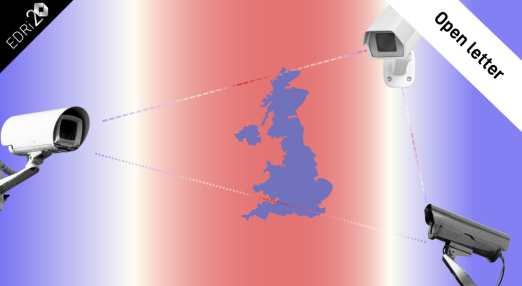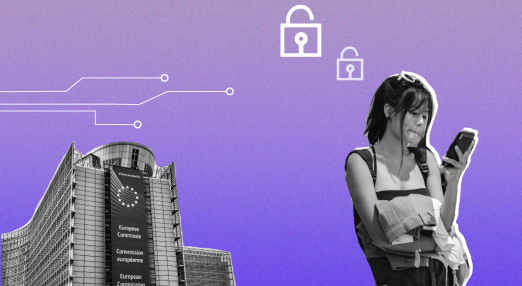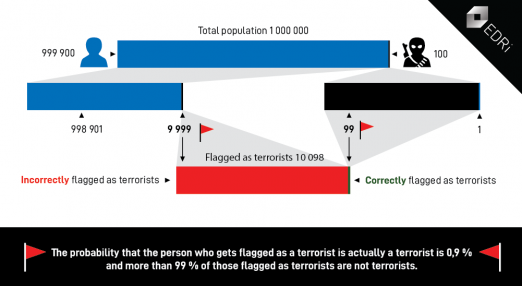Security
Filter by...
-

The Security Playbook
EDRi affiliate SUPERRR is challenging “Security Theater” as a societal maneuver.
Read more
-

Irish Media Regulator must address dangerous age verification in its new online safety code
On 30 January 2024, EDRi submitted its comments on the Irish Media Regulator’s (Coimisiún na Meán) new Online Safety Code in a public consultation, highlighting significant concerns about age verification.
Read more
-

Online Safety Bill insecure: international organisations, academics and cyber experts urge UK government to protect encrypted messaging
EDRi, Open Rights Group and over 80 civil society organisations, academics and cyber experts from 23 countries have written to the UK government to raise the alarm about proposed powers in the Online Safety Bill.
Read more
-

Securing privacy: Privacy International on end-to-end encryption
EDRi member Privacy International's (PI) report on end-to-end encryption (E2EE) analyses and defends expanding the use of E2EE to protect our communications. It defines E2EE, delves into its human rights implications, briefly addresses some prominent proposals for government access to E2EE content, and concludes with PI’s recommendations regarding E2EE.
Read more
-

Private and secure communications attacked by European Commission’s latest proposal
On 11 May, the European Commission put forward a proposal for a ‘Regulation laying down rules to prevent and combat child sexual abuse’ to replace the interim legislation that EDRi fought against last year. In our immediate reaction, EDRi warned that the new proposal creates major risks for the privacy, security and integrity of private communications, not just in the EU, but globally. Here, we unpack a bit more about the legislative proposal, and why we are so concerned.
Read more
-

Spotify, don’t spy: global coalition of 180+ musicians and human rights groups take a stand against speech-recognition technology
“You can’t rock out when you’re under constant corporate surveillance. Spotify needs to drop this right now and do right by musicians, music fans, and all music workers.” - Tom Morello
Read more
-

12 benchmarks for the reform and oversight of intelligence services in Austria
EDRi member epicenter.works presents the benchmarks against which the new reform of the Austrian Federal Agency for State Protection and Counterterrorism must be measured. With these criteria, guided strongly by international standards and jurisdiction, epicenter.works expect the legislative proposals on the reform in the next few weeks, ready to defend fundamental human rights.
Read more
-

The pros and cons of moving to e-IDs
EDRi member Epicenter.works give their position on electronic identity (e-ID) in light of the continues work on e-ID in Austria. They share that as convenient as the e-ID may seem and as much it is being communicated as the logical evolution of the classic ID, caution must be exercised when it comes to creating, storing and accessing sensitive identity data. Utmost caution is required when the private sector and the state use shared infrastructures for this purpose.
Read more
-

Germany: Invading refugees’ phones – security or population control?
In its new study, EDRi member Society for Civil Rights (GFF) examines how German authorities sniff out refugees’ phones. The aim of “data carrier evaluation” is supposed to be determining a person’s identity and their country of origin. However, in reality, it violates refugees’ rights and does not produce any meaningful results.
Read more
-

Stalked by your digital doppelganger?
In this fourth installment of EDRi’s facial recognition and fundamental rights series, we explore what could happen if facial recognition collides with data-hungry business models and 24/7 surveillance.
Read more
-

Casual attitude in intelligence sharing is troubling
A recent report by Dutch Military Intelligence and Security Service CTIVD shows that the Dutch secret services regularly violate the law when sharing intelligence with foreign services. For the sake of privacy and freedom of communication, it is crucial that data sharing safeguards are both tightened and more strictly enforced.
Read more
-

Why EU passenger surveillance fails its purpose
The EU Directive imposing the collection of flyers’ information (Passenger Name Record, PNR) was adopted in April 2016, the same day as the General Data Protection Regulation (GDPR). The collection of PNR data from all flights going in and out of Brussels has a strong impact on the right of privacy of individuals and it […]
Read more
